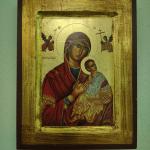Easter season ends with Pentecost. Often it is lost in the shuffle in church worship and program planning. This year I will leave church to rush off to the beginning of Annual Conference. Hopefully, our worship that night will link the birthday of the Church with the business of the Church. But I want to see how these matters relate to discipleship.
Pentecost and Shavuot
A rabbi described the High Holy Day of Shavuot to my confirmation class. I said, “We call it Pentecost.” He replied, “Yes. And you get it wrong too.” Maybe. I know what it is supposed to be. But I know how Christians came to regard it differently. Yes, our celebration of Pentecost is not Shavuot. We don’t necessarily celebrate at the same time.
The story of Pentecost begins the process of the Church beginning to separate from the religious heritage of the Apostles and Jesus. The Holy Spirit is poured out on Jesus’ disciples and later on gentiles who become disciples of Jesus. We celebrate it by wearing red colors to signify the work of the Spirit.
Pentecost is important for the Church for a couple of reasons. Jesus promises it to the disciples. There was no promise of such a dramatic effect. But the effect is necessary for a group of 120 followers in hiding to come out an declare their faith openly. The last reason is so the disciples can live openly as a community of faith demonstrating the life of the Kingdom.
Discipleship In This Light
Dietrich Bonhoeffer individualized discipleship in his classic The Cost of Discipleship. Another of his works Life Together is not as well known or simply ignored. “When Christ calls a man, he bids him come and die.” These are powerful words interpreting the Gospel in light of a particularly dark time. During dark times many disciples stand alone. But it is not supposed to be that way all of the time.
The number of disciples on Pentecost increases. They decide to live in community much like the people of Qumran, Samuel’s community of prophets, or some communities developed by Greek philosophers including Epicurus. The fellowship of participants is the outpost of the reign of Christ. “All who believed were together and had all things in common; they would sell their possessions and goods and distribute the proceeds to all, as any had need. Day by day, as they spent much time together in the temple, they broke bread at home and ate their food with gladness and generous hearts, praising God and having the good will of all the people. And day by day the Lord added to their number those who were being saved.” (Acts 2:44-47) The Pentecost community is the first public expression of following Jesus after the Resurrection.
Pentecost Community
It did not last. Enthusiasm is difficult to maintain. The first crack was the lies of Ananias and Sapphira. The next one had to do with the daily distribution to the widows. Then community all but dissolved in the persecution that drove the Apostles out of Judea. Optimism about the kingdom of heaven is hard to maintain during these times. Yet, it was.
The Pentecost Community evolved and continues to do so as the Church. Acts is written to for this reason. But some trends, as we see demonstrated in the Pentecost community, are not good.
- Distinctions among groups of people is not good. Discipleship is universal (or catholic). We should not consider another follower of Jesus as “less than” ourselves. The issue about daily allotments to widows reflected a distinction made because of their places of origin.
- Individualism is not discipleship. Personal integrity is. Desires for wealth and power are destructive to community. Being self-absorbed is detrimental to following Jesus.
- Being a follower of Jesus requires loyalty to one another. The only reason the community survived persecution is they sought each other after it ended.
Being Together
Churches often emphasize membership. Church leadership is concerned with the number of members, the number of new members, and how “active” the members are. It is difficult to plan ministry without having some knowledge about who will be carrying out the work. While membership is not discipleship, the latter includes the former. Discipleship is not simply a good disposition toward Jesus. Discipleship is being in ministry together. And that requires commitments be made to each other.
Individualist attitudes eschew commitments. We want to know what we are getting before we buy it. Jesus never offered that answer to his disciples. It is hard to understand something one is not ready to comprehend. But, this leaves us stunted. Scientific inquiry is not based on guaranteed results. Business ventures are not either. So why do so many people balk at making a commitment to a community of believers unless the commitment is strictly on their own terms?
Discipleship And Pentecost
The Pentecost community prayed for boldness to face the unknown future (Acts 4:24-31) and then continued in what they begun. “Now the whole group of those who believed were of one heart and soul, no one claimed private ownership of any possessions, but everything they owned was held in common. With great power the apostles gave their testimony of the resurrection the Lord Jesus, and great grace was upon them.” (4:32-33) Grace was not a promise of forgiveness. It was a demonstration of inclusion. “There was not a needy person among them, for as many as owned lands or houses sold them and brought the proceeds of what was sold. They laid it at the apostle’s feet, and it was distributed to each as any had need.”(4:34-35)
This is the Spirit of Pentecost the world needs to see in all who claim to be followers of Jesus of Nazareth.












